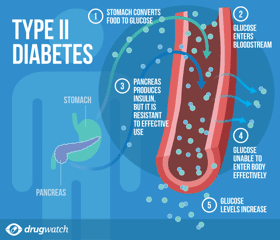By Barry Keate
Barry Keate, has lived with tinnitus over 40 years and has published 150+ research articles on numerous aspects of tinnitus. He is an expert on the condition and a well-known advocate for those with tinnitus.
There is a direct link between insulin resistance, diabetes, and tinnitus. Studies have shown that most people with tinnitus have one of these conditions and treating them with diet and exercise can result in a significant reduction in tinnitus symptoms. There is a similar relationship between sugar metabolism disorders and Meniere’s disease.
Exploring Insulin Resistance
Insulin resistance refers to the condition where there is an elevated level of insulin in the bloodstream. It is also known as hyperinsulinemia. This occurs when insulin becomes inefficient at transferring glucose (sugar) from the bloodstream into the body’s cells. The pancreas then produces additional insulin. Over time, the pancreas cannot keep up with the decreased efficiency of the insulin and the result is clinical diabetes. This is called adult-onset Type II Diabetes.
People who develop insulin resistance and Type II Diabetes typically have consumed excessive amounts of carbohydrates (sugars) for many years, which causes stress on the normal insulin/glucose transfer action until resistance develops.

Insulin resistance and Type II Diabetes can be controlled through diet and exercise. In fact, insulin resistance can be controlled to the point where diabetes never develops. But how do these conditions cause tinnitus?
The inner ear, like the brain, does not have fat reserves or any source of stored energy. It relies entirely on the delivery of oxygen and glucose from the bloodstream. If glucose delivery is interrupted, the cochlea and vestibular systems become dysfunctional. Tinnitus as well as Meniere’s disease can be the result of this condition. We published an earlier (and longer) version of this subject, Sugar Metabolism, Ketones and Tinnitus.
A study on Insulin Resistance and Tinnitus
A clinical study was conducted in Brazil on people who had tinnitus and insulin resistance. The study was published in the International Tinnitus Journal. The authors stated that previous studies had shown between 84% and 92% of people with tinnitus had insulin resistance. (1)
The participants in the study were instructed to begin a diet suitable for diabetics. They began a two-year diet designed to return insulin to normal levels. They were asked to eat every three hours so as not to become hypoglycemic (low blood sugar), avoid simple sugars and carbohydrates, lower intake of fatty foods, restrict themselves to no more than two cups of coffee or caffeinated drinks per day, limit intake of alcoholic beverages and drink four to six glasses of water per day.
Of the original 80 participants who joined the study, 59 adhered to the diet and 21 did not. The likelihood of having decreased tinnitus symptoms was five times greater in those who kept to the diet (76%) than those who did not (14%).
Specifically, of those who followed the diet for at least two years, 24% had no improvement, 22% had some improvement, 39% had clinically significant improvement and 15% had complete resolution. In all, 74% had improvement and, of those, 54% had significant improvement or total resolution of their tinnitus.
A look at Meniere’s disease and Diabetes
Meniere’s disease also seems to be an outgrowth of insulin resistance and Type II Diabetes. Although there has not been a detailed study like the one above that I can find, there is clinical evidence for the relationship. Another study published in the International Tinnitus Journal found that fully 72% of Meniere’s disease patients in the study had some degree of insulin resistance or diabetes. (2)
Dietary considerations have been known to help with the vertigo caused by Meniere’s. The Vestibular Disorders Association recommends a diet very similar to that of the diabetic diet. (3)
The earlier the identification of a metabolic disorder, such as insulin resistance, the better the response to treatment. This includes for tinnitus but also for vertigo and prevention of hearing loss. The presence of insulin resistance and/or diabetes should be investigated for every patient presenting with cochlear or vestibular disorders
The best method for determining if these conditions are present is the 5-hour insulinemic and glycemic curve test. This involves the patient consuming 100 grams of glucose and having periodic blood tests to determine how efficiently the sugar is processed. There are shorter tests but they are not as accurate as the 5-hour test. Fasting glucose level testing is 10% accurate and 2-hour testing is 89% accurate. Only the 5-hour test has an accuracy of 99%.
If you have tinnitus or Meniere’s disease, it will be a good idea to have your sugar metabolism checked. It could lead to an improved treatment regimen. For more articles about tinnitus and tinnitus causes, sign up for our free tinnitus newsletter.
References:
1 – Lavinsky L, Oliveira MW, Bassanesi HJ, D’Avila C, Lavinsky M. “Hyperinsulinemia and tinnitus: a historical cohort.” Int. Tinnitus J. 2004;10(1):24-30.
2 – D’Avila C, Lavinsky L. “Glucose and insulin profiles and their correlations in Meniere’s disease.” Int. Tinnitus J. 2005;11(2):170-76.
3 – http://vestibular.org/understanding-vestibular-disorders/treatment/vestibular-diet
Get Free Shipping!
Order now and get free shipping on either the Tinnitus Starter Kit or Combo Pack. Try the doctor recommended products with clinically proven ingredients for tinnitus. No coupon code required.

